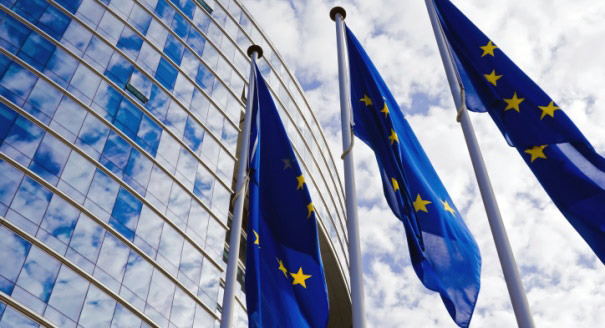Nathalie Tocci, Jan Techau
{
"authors": [
"Jan Techau"
],
"type": "commentary",
"blog": "Strategic Europe",
"centerAffiliationAll": "",
"centers": [
"Carnegie Endowment for International Peace",
"Carnegie Europe"
],
"collections": [],
"englishNewsletterAll": "",
"nonEnglishNewsletterAll": "",
"primaryCenter": "Carnegie Europe",
"programAffiliation": "",
"programs": [],
"projects": [],
"regions": [
"Western Europe",
"Germany",
"Europe"
],
"topics": [
"EU",
"Foreign Policy"
]
}
Source: Getty
Three Treacherous Tales of Power in Europe
From the selection of the EU’s new leadership team to Germany’s role in Europe, EU foreign policy offers a number of revealing cases of misperceived power.
Four weeks of summer are looming, and everyone likes a good thriller to read on the beach. Europe has many thrillers on offer but also a few exciting tales about power calculations gone awry. Let me use my last blog before the famous Brussels “congé” to muse about three such cases.
Don’t Worry About Ashton’s Successor So Much
This week, European leaders will most likely determine who gets what job in the new EU leadership team scheduled to take office in the fall.
Foreign policy junkies have been discussing breathlessly who could and should replace Catherine Ashton as EU high representative for foreign affairs and security policy. Many fear that it could be the inexperienced Italian Foreign Minister Federica Mogherini, who is clearly controlled by her prime minister, Matteo Renzi.Some suggest that Kristalina Georgieva, currently EU commissioner for humanitarian aid, would be a good choice. She obviously has a deep knowledge of Brussels’s wheeling and dealing and can sport a successful earlier stint at the World Bank.
As for myself, I have never made much of a secret of my sympathy for Polish Foreign Minister Radek Sikorski, who, I think, would bring experience, ambition, and fearlessness to the job of high representative. But I can also see how being diplomatic and depolarizing (a key skill when it comes to winning over the big EU capitals and to forging compromise among 28 member states) has not always been his forte.
In any case, a dose of realism is needed here. The truth is that the job of EU high representative matters a lot less than most people think. Political practice under the Lisbon Treaty has made clear that it can be useful, on occasion, to have a skilled high representative. Yet experience has also shown that real EU foreign policy progress depends far more on member states investing in a common position than on the leader of the European External Action Service (EEAS).
As it is unlikely that even the most skillful EU foreign policy chief could drive the member states in the way that former high representative Javier Solana drove them in the early 2000s, much more attention should go on what leaders want in Paris, Berlin, London, Warsaw, and perhaps Rome.
In the years to come, the high representative’s importance will lie primarily in one task: finally building something that resembles a team spirit within the EEAS. Ashton failed horribly at this undertaking, which would require a seasoned bureaucrat with a corporate vision, political resilience, and supreme people skills.
Will the EU get such a persona? Everyone should hope so. Because the best long-term contribution a new EU foreign policy chief can make is to render the EEAS strong enough to be an instrument the member states like to use. That would be no small feat.
The European Parliament Will Pay for Its Power Grab
Europe’s word of the year must be Spitzenkandidaten. The idea of naming party-political candidates for the job of European Commission president, one of whom would become the automatic choice for the post after the European Parliament elections, has not brought luck to everyone.
I freely admit that I was wrong on how much of a political dynamic this cunning scheme would develop. Hats off to the strategists at the European Parliament and to the team of president-designate Jean-Claude Juncker, who executed this power grab with farsightedness and guts. I still believe that this is the wrong way to politicize the EU, as it politically hypercharges a personnel issue without any real political and constitutional framework to support such a plan.
What’s more, I believe that the parliament’s joy at having prevailed will be short-lived. The EU’s heads of state and government will never underestimate this instrument again, and they will handle the situation much more carefully next time around to avoid being strong-armed again.
Most importantly, more people than ever have realized how unaccountable, power hungry, and self-centered the European Parliament’s way of working is. Its legitimacy is shaky and its moral grandstanding often unbearable. Unlike in any other political system, neither institutional responsibilities nor real political competition discipline parliamentarians in their free-wheeling legislative existence.
There is less and less appetite across the EU for this kind of overbearing behavior. Whatever institutional reform might come to the EU at some point will clearly address this issue. The parliament got away with the so-called Spitzenkandidaten. But it will pay the price for this victory at some point. May it be a price commensurate with the institutional hijacking it undertook in 2014.
Germany Is Allergic to Its Own Power
Cambridge University historian Brendan Simms has brilliantly described how, since at least the fifteenth century, European history has been driven by the struggle for control over, and by the dominance of, Germany. That struggle continues today. As always, Germany is an attractive prize to win.
Berlin is one of the four or five key geopolitical powers in the world today. It is deeply involved in all strategic issues that matter, be it Russia, China, Iran, international finance, or world trade. Germany is also the country that effectively runs the EU. Its weight, its policies, and its decisions count.
As a consequence, almost everyone is trying to indoctrinate (Russia), spy on (America, Russia, China), win over (Britain, Poland), convince (Italy, Greece, Spain), or economically bind (China) the Germans.
The only ones oblivious to all this are the Germans themselves. They do not realize how much of a key player their country already is. As they are not fully confident that they will end up on the right side of history again, their own influence is a terrible inconvenience to them. Germans have an allergic reaction to their own power.
It is true that restraint is a good thing for Germany. That is not solely because of history; it is because the biggest, richest, most centrally located nation in Europe must tread carefully and sensitively in its foreign policy. But Germany can strike that delicate balance only if it is aware of its own size.
The biggest risk in Europe today is not Germany’s size but that Germans prefer to ignore it. Chancellor Angela Merkel’s biggest leadership challenge will be to make the Germans feel comfortable about their power while maintaining the complete absence of any appetite for domination that characterizes Germany today.
I wish all followers of Strategic Europe and all foreign policy junkies a great, peaceful, and relaxing summer.
About the Author

Director, Europe Team, Eurasia Group
Techau is director with Eurasia Group's Europe team, covering Germany and European security from Berlin. Previously, he was director of Carnegie Europe.
- Can Europe Trust the United States Again?Commentary
- Pre-Reformation Europe and the Coming SchismCommentary
Jan Techau
Recent Work
Carnegie does not take institutional positions on public policy issues; the views represented herein are those of the author(s) and do not necessarily reflect the views of Carnegie, its staff, or its trustees.
More Work from Strategic Europe
- Taking the Pulse: Can European Defense Survive the Death of FCAS?Commentary
France and Germany’s failure to agree on the Future Combat Air System (FCAS) raises questions about European defense. Amid industrial rivalries and competing strategic cultures, what does the future of European military industrial projects look like?
Rym Momtaz, ed.
- Macron Makes France a Great Middle PowerCommentary
France has stopped clinging to notions of being a great power and is embracing the middle power moment. But Emmanuel Macron has his work cut out if he is to secure his country’s global standing before his term in office ends.
Rym Momtaz
- How Europe Can Survive the AI Labor TransitionCommentary
Integrating AI into the workplace will increase job insecurity, fundamentally reshaping labor markets. To anticipate and manage this transition, the EU must build public trust, provide training infrastructures, and establish social protections.
Amanda Coakley
- Can Europe Still Matter in Syria?Commentary
Europe’s interests in Syria extend beyond migration management, yet the EU trails behind other players in the country’s post-Assad reconstruction. To boost its influence in Damascus, the union must upgrade its commitment to ensuring regional stability.
Bianka Speidl, Hanga Horváth-Sántha
- Taking the Pulse: Can the EU Attract Foreign Investment and Reduce Dependencies?Commentary
EU member states clash over how to boost the union’s competitiveness: Some want to favor European industries in public procurement, while others worry this could deter foreign investment. So, can the EU simultaneously attract global capital and reduce dependencies?
Rym Momtaz, ed.










